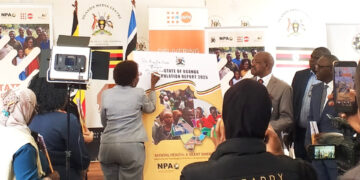By Leonard Kamugisha Akida,
NATIONAL
On Thursday, the minister of state for finance, Henry Musasizi tabled before parliament a proposal by government seeking to purchase 150,000 preference shares in Roko Construction Limited.
According to the minister, the shares will be worth 202.13 billion Shillings which will be paid over a period of five years. He said this is intended to provide financial support to the financially sick company to enable it have necessary liquidity to meet its operational needs and other obligations.
In a statement read to parliament, the payment will consist of shares purchased at a par value worth 150 billion Shillings and a share premium value estimated at 57.6 billion Shillings.
The proposal has however been ardently rebuffed by different economic experts and politicians arguing that government should instead rescue local contractors but not foreign companies contracting multibillion deals.
Harold Kaijja, an economist turned politician and the deputy Secretary General of the Forum for Democratic Change (FDC) says that bailing out foreign companies is unpatriot.
“Bailing out foreign companies is Anti-Uganda and unpatriotic which Mr. Museveni is always talking about,” said Kaijja
According to him, should rescue local companies that are on verge of collapsing to ensure sustainability.
“The best person to bail out must be a Ugandan. Investors who run out of money should pack their bags and be sent back home,” he added.
Kaijja was speaking to journalists at FDC headquarters in Najjanankumbi Kampala on Monday where he revealed that the FDC has directed its MPs to reject the proposal in parliament.
“We are sending our MPs to Parliament to object to the proposal of bailing out Roko Construction Company, which has the best construction deals in Ug.” Kaijja explained

Liquidity challenges
Parliament heard that Roko has been faced with severe liquidity challenges that have constrained its ability to execute contracted projects that have adversely affected payments to its various suppliers and the financial sector. The company is currently significantly indebted and its indebtedness as of May 31, 2022, totals 202.4 billion Shillings.
It also has contingent liabilities from bank guarantees of 130.9 billion Shillings while its indebtedness to financial institutions totals 35.7 million US Dollars and 20.7 billion, bank guarantees issued for ongoing projects amount to 130.9 billion, which would be retired as projects are executed, and dues to local suppliers are 46.8 billion.
According to minister Musasizi, the liquidity constraints have affected various government construction projects including, the Parliament of Uganda, the Inspectorate of Government, the Uganda Cancer Institute, and the Ministry of Finance.
He explains that the genesis of the company’s liquidity situation arose primarily from delayed payments on major projects, failure to refinance expensive Shilling loans with cheaper external financing, the impact of the COVID-19 pandemic on the construction industry while financing costs continued to escalate, and weak corporate governance and inadequate management.
Roko currently has projects in hand with signed contracts worth a total of 1.064 trillion Shillings, of which 696.6 billion Shillings are government of Uganda projects. Out of the 1.064 trillion worth of contracts, 292 billion equivalent works remain uncompleted.
“The consequence of the company’s collapse would therefore impact these projects negatively. The Uganda National Association of Building and Civil Engineering Contractors (UNABCEC) estimates that government would incur an additional 120 billion Shillings in placing these contracts with new contractors if the company was wound up,” Musasizi told parliament last week.

He appealed for authorization from Parliament in order to salvage Roko Construction and allow it to implement its outstanding project contracts by injecting 159.6 billion Shillings, through the acquisition of 150,000 preference shares at a nominal value of 1 million Shillings per share and a share premium of approximately 57.13 billion Shillings.
He explains that the share premium is being paid because the government’s acquisition will be paid for over 5 years. The share premium consists of the financing costs and exchange rate costs associated with the payment preference shares over five years and the conversion of 42 million US Dollars facilities from TDB to ROKO Construction.
Parliamentary Action
Parrots UG has learned that the speaker of parliament Rt Hon. Anitah Annette Among has since
referred the government proposal to the Committee of Finance for consideration and to report back in one week. Roko has in the past executed major building projects in Uganda including Workers House, Crested Towers, the Namugongo Shrine, Bank of Uganda and Mapeera House, among others.
What the law says
Section 23 of the Public Finance Management Act 2015, provides that a Vote cannot enter into a transaction or agreement that binds the government to a financial commitment for more than one financial year, except where the financial commitment is authorized by Parliament.






































